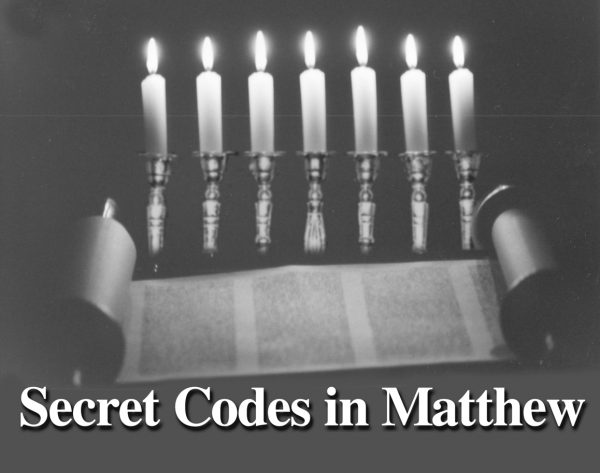The Secret Codes in Matthew: Examining Israel’s Messiah, Part 18: Matthew 22:41-23:39, by Kevin M. Williams
In this installment of this unique commentary on the Gospel to the Hebrews, Yeshua asks His examiners a question, “What do you think about the Christ, whose son is He?”

Now while the Pharisees were gathered together, Jesus asked them a question, saying, “What do you think about the Christ, whose son is He?”
They said to Him, “The son of David.”
He said to them, “Then how does David in the Spirit call Him ‘Lord,’ saying, ‘The Lord said to My Lord, “Sit at My right hand, until I put Thine enemies beneath Thy feet”’?
“If David then calls Him ‘Lord,’ how is He His son?” And no one was able to answer Him a word, nor did anyone dare from that day on to ask Him another question (Matthew 22:41-46).
As we begin part 18 with a cunning yet indirect declaration of Jesus’ messiahship, it seems prudent to remember the purpose of this series. Matthew is out to demonstrate that this man from Galilee was the long awaited Messiah of Israel. His gospel is written for the Jewish people to help them discover the reality of their Redeemer.
Here are a few thoughts on what transpires as Yeshua (Jesus) artfully dissuades the Pharisees from troubling Him with more questions.
First, Yeshua gives us an insight into the character of King David when He states that David was “in the Spirit.” That is an interesting commentary on the 110th Psalm. The Old Testament text does not say that David was “in the Spirit,” but the Messiah—the Word made flesh—clearly establishes that the King of Israel was “in the Spirit.” There is no argument on this point from the Pharisees. Those who might criticize the Pharisees for being “non-spiritual,” need to understand that they do not make Yeshua’s commentary a point of contention. There appears to be a tacit agreement that a person could/can be “in the Spirit.” For those of us today, it also helps establish that before the giving the Holy Spirit at Pentecost, there were those who could operate “in the Spirit.”
Next, Yeshua is an artful asker of questions—a very Jewish trait. In our society we have a tendency to talk more than we ask; we lecture more than we engage. In the Hebrew culture—then as well as now—this is not so. The Messiah asks an easy question, “What do you think about the Messiah, whose son is He?” This question is one to which all Jewish people knew the answer, regardless of religious sect. The Messiah (Christos in the Greek) will be the son of David. There is no argument here and thus Yeshua paints these learned men into a proverbial corner.
Category: Biblical Studies, Pneuma Review, Summer 2005


